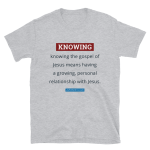Reflecting back on my experience and education, I started thinking about church growth. More specifically, how to start a church growing that has plateaued or is in decline. Church revitalization is the term given for helping these churches experience new life and growth.
The first step of any revitalization is an honest self-evaluation. I strongly recommend an objective third party help in order to overcome the situation of possibly being too close to see the problem.
Here are three questions that will help you begin to look at your church’s current situation and ministry effectiveness.
1. Do you know your community?
A church that doesn’t know and understand the community won’t effectively reach the community.
Knowing the community is more than understanding its history; it is recognizing how the community looks and behaves in the present day. Communities evolve as people move in and out, and thus the demographics, character, and culture of a neighborhood or town change over time. Does your church fully understand the community as it is right now?
2. Do you value your community?
A church that doesn’t value the community won’t effectively reach the community.
Valuing the community means appreciating and desiring to learn about the people regardless of economic status, race, or culture. It also means being open to the church reflecting the community’s demographics as people begin attending regularly and even joining the church. In short, valuing the community means loving the people as God loves them. Does your church truly value the community.
3. Do you engage your community?
A church that doesn’t engage the community won’t effectively reach the community.
That statement, although truistic, is often overlooked. It’s one thing to know the community and to value it. It’s another to actively, intentionally engage those around us. Engaging the community means going to where the people are and reaching them in their life situations. This may require crossing cultural or racial divides. It may mean developing entire new strategies or hiring new staff. Regardless, a local church body must begin engaging the community in which it resides. Does your church actively engage those around it?
These three questions are valuable for more than just church revitalization. They are beneficial to any church that desires to maintain an active, effective outreach strategy.
I hope these help you. If there are other questions that can help a church begin the process of evaluating its evangelistic outreach, comment below.














